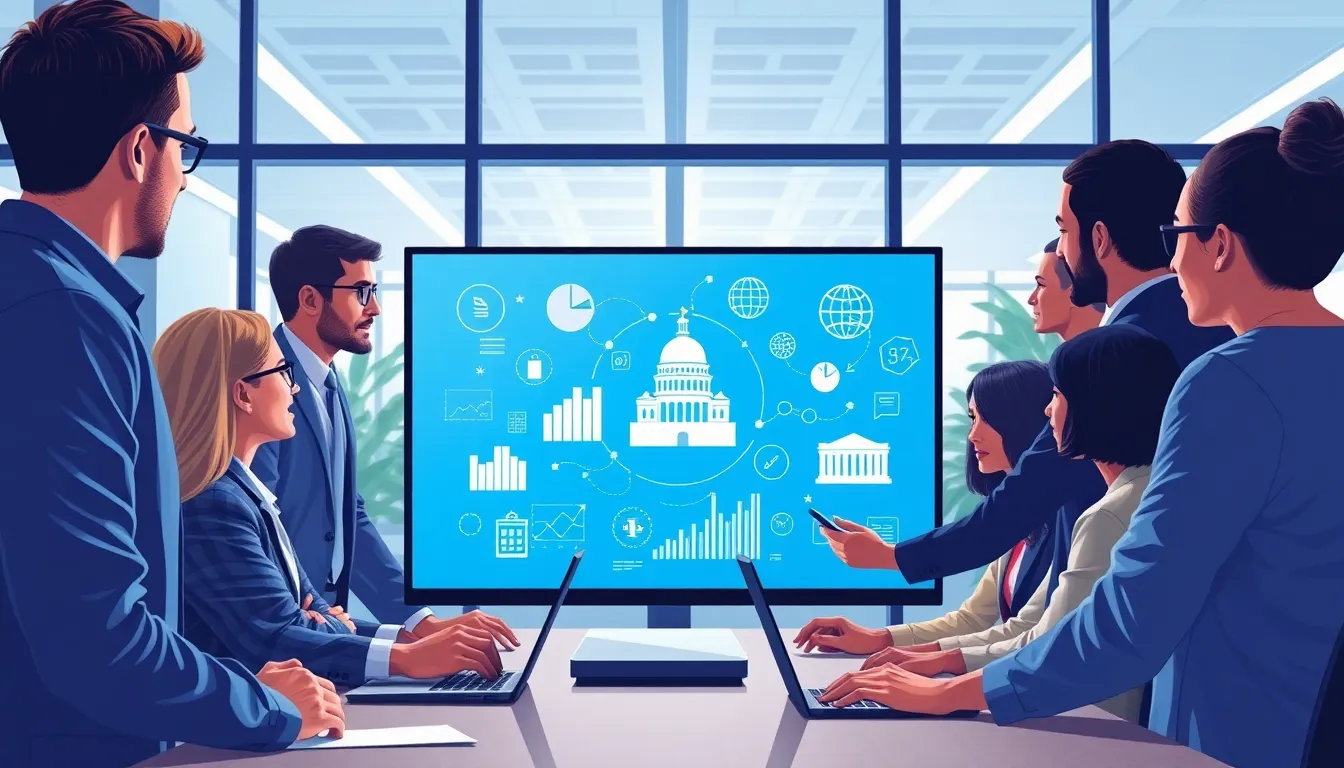In a world where bureaucracy often feels like wading through molasses, govtech companies are the superheroes we didn’t know we needed. They swoop in with innovative tech solutions that transform government services from sluggish to speedy, making life easier for citizens and officials alike. Think of them as the IT crowd for public sector problems—minus the awkward small talk.
These companies are revolutionizing how governments operate, making processes more efficient and user-friendly. From streamlining permit applications to enhancing public safety, govtech is paving the way for a smarter, more responsive government. So, buckle up as we explore the exciting universe of govtech companies, where technology meets public service, and discover how they’re changing the game for good.
Table of Contents
ToggleOverview of Govtech Companies
Govtech companies serve as catalysts for digital transformation in public administration. These firms develop technologies that enhance citizen engagement and optimize operational efficiency. Innovations include data analytics tools, mobile applications, and platforms for online service delivery. By automating bureaucratic tasks, these companies significantly reduce processing times, benefiting both government workers and the public.
Numerous sectors benefit from govtech solutions. For instance, urban planning relies on software to analyze land use efficiently. Education systems adopt cloud-based platforms, facilitating better communication between teachers, students, and parents. Public safety sectors utilize predictive analytics, improving emergency response capabilities.
Investment in govtech is on the rise. According to reports, global investment reached $15 billion in 2022, a clear indication of the growing trust in technology’s role in governance. As more governments prioritize digitalization, competition among tech startups intensifies. This trend typically leads to innovation and improved services.
Partnerships between govtech companies and governmental agencies ensure that these solutions are user-centric. Collaborative efforts often result in tailored tools that address specific community needs. By focusing on user experience, these firms create solutions that are not only effective but also accessible to all citizens.
Regulatory compliance remains a key consideration for govtech companies. They must navigate complex legal frameworks while safeguarding user data. Adhering to privacy laws, these companies build trust and legitimacy with stakeholders.
As they continue to evolve, govtech companies significantly shape the future of public services. Their impact on governance not only streamlines processes but also fosters a more transparent and responsive government.
Key Players in the Govtech Space

Numerous companies drive innovation in the govtech sector. These players enhance government services, improve efficiency, and strengthen citizen engagement.
Innovative Startup Examples
Startups are shaking up the govtech landscape with unique solutions. For example, CityBase focuses on facilitating payments for city services, enabling seamless transactions for residents. Another example, SeamlessDocs, offers a platform that digitizes forms and automates data collection, streamlining operations for government agencies. Furthermore, Omniradar leverages data analytics to provide insights into community trends, enhancing decision-making for local governments. Each startup addresses specific needs within the public sector, driving digital transformation and improving service delivery.
Established Companies Making an Impact
Established companies also play a crucial role in govtech innovation. Accela has provided software solutions that streamline permitting and licensing processes for municipalities, enhancing operational efficiency. Moreover, Tyler Technologies offers comprehensive software solutions for public safety, tax assessment, and court management, aligning with government needs. Additionally, IBM delivers advanced data analytics tools that help governments make informed decisions based on real-time data. These companies have a proven track record and significantly influence the effectiveness of government operations and public engagement.
Key Technologies in Govtech
Govtech companies utilize advanced technologies to enhance government efficiency and engagement. These technologies include artificial intelligence and blockchain, both of which play vital roles in modern governance.
Artificial Intelligence Applications
AI streamlines various aspects of public service. Predictive analytics assists emergency services in anticipating incidents, improving response times and resource allocation. Chatbots provide instant support for citizen inquiries, greatly enhancing user experience. Additionally, machine learning algorithms analyze data trends, helping policymakers make informed decisions. AI tools also help automate bureaucratic tasks, reducing workload for government employees while increasing overall workflow efficiency.
Blockchain for Government Transparency
Blockchain enables greater transparency in governmental operations. Trackable and immutable records foster trust among citizens, ensuring accountability in public spending and election processes. Smart contracts automate routine transactions, minimizing the risk of fraud and errors. In addition, blockchain facilitates secure data sharing between agencies, streamlining processes that traditionally take longer. Governments implementing blockchain create a more transparent environment, boosting public confidence in their operations while enhancing data integrity.
Challenges Facing Govtech Companies
Govtech companies face several challenges that impact their growth and effectiveness in transforming public services. Navigating these obstacles is essential for their success.
Regulations and Compliance
Regulatory frameworks present significant challenges for govtech companies. Compliance with complex legal requirements is mandatory, often varying across jurisdictions. Ensuring data protection and privacy adds another layer of complexity. Companies must develop solutions that meet stringent guidelines while maintaining user-centric designs. Adapting to evolving regulations can strain resources and delay deployment of innovative technologies. Ultimately, successful navigation of compliance issues builds trust with government agencies and citizens.
Budget Constraints in Government Contracts
Budget constraints impose limitations on govtech companies involved in government contracts. Governments often operate under tight financial conditions, which leads to delayed approvals and reduced project scopes. Securing funding for innovative initiatives can become competitive, with multiple startups vying for limited resources. Additionally, prioritizing cost-effective solutions sometimes compromises the quality of services. Striking a balance between affordability and innovation is crucial for govtech firms seeking long-term partnerships. Sustainable models that demonstrate value and efficiency can enhance their chances of success in this competitive environment.
Future Trends in Govtech
Govtech companies are poised for significant advancements in enhancing government services. These trends reflect a strong commitment to improving public administration efficiency.
Increased Data Security
Increased data security stands as a top priority as cyber threats grow. Government entities require robust protection measures for sensitive information shared through digital platforms. Companies are investing in advanced encryption methods and secure cloud services to safeguard citizen data. Compliance with regulations like the General Data Protection Regulation (GDPR) remains crucial in maintaining trust. Sophisticated authentication methods such as biometrics are gaining traction, offering enhanced verification processes. Organizations successfully implementing these measures can bolster public confidence in digital governmental interactions.
Public-Private Partnerships
Public-private partnerships are becoming essential for driving innovation in govtech. Collaborative efforts between tech firms and government agencies enable the development of tailored solutions addressing specific community needs. These alliances facilitate resource sharing, combining public sector expertise with private sector agility. Companies like Accela and Tyler Technologies exemplify successful collaborations, delivering effective software solutions that streamline operations. Utilizing shared insights, stakeholders can better address challenges and optimize resources. Increased investment in these partnerships fosters a culture of continuous improvement within public administration.
Govtech companies are redefining how governments operate and engage with citizens. By leveraging technology, they streamline processes and enhance service delivery, making public administration more efficient and responsive. The rise of innovative solutions and strategic partnerships indicates a promising future for these companies as they navigate challenges and prioritize data security.
As investment continues to grow, the collaboration between tech firms and government agencies will likely lead to even more tailored solutions that meet community needs. This evolution not only boosts public trust but also paves the way for a more transparent and accountable government. The ongoing advancements in govtech will undoubtedly shape the future of public services for years to come.






